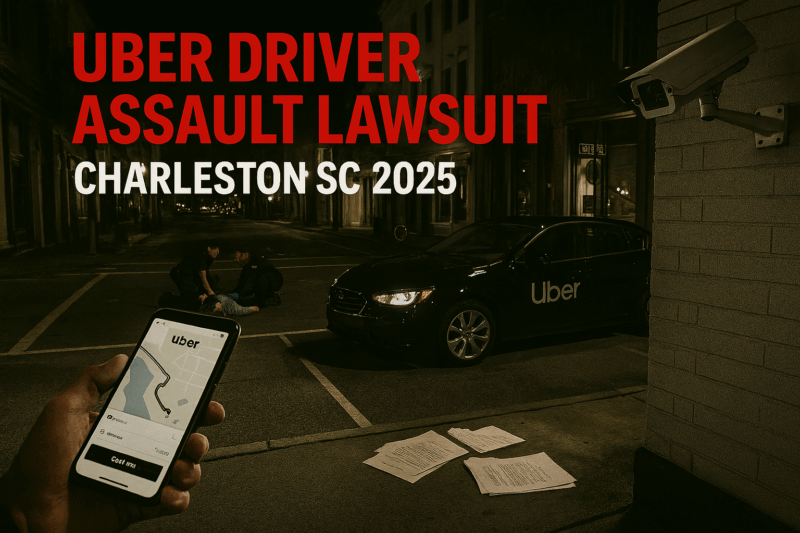Uber Driver Assault Lawsuit: Biotech CEO Files Suit After Violent Attack
TC BioPharm CEO Bryan Kobel filed a major lawsuit against Uber after suffering a brutal assault by an illegal immigrant driver caught on security cameras in downtown Charleston, South Carolina. The Uber driver assault case highlights serious concerns about rideshare company background checks and passenger safety protocols.
The violent Uber driver assault occurred in April when Russian national Uliumdzhiev Vadim Nikolaevich, 42, attacked Kobel in a King Street restaurant parking lot. Surveillance footage captured the shocking assault where the Uber driver grabbed Kobel by the throat, headbutted and punched him, leaving the biotech CEO unconscious with his service dog crashing to the pavement.
Details of the Charleston Uber Driver Assault Case
The Uber driver assault lawsuit, filed Monday in Charleston County court, reveals disturbing details about the violent incident. Kobel, 45, sustained a severe concussion and required seven staples for head lacerations after the unprovoked attack by the Uber driver.
Key facts about the Uber driver assault:
- Nikolaevich was arrested for second-degree assault and battery
- Released on $10,000 bond before ICE detention in Georgia
- Used fake driver’s license to access Uber platform
- Continued picking up passengers after the violent assault
- Kobel’s Uber account was suspended while driver remained active
The Charleston Uber driver assault case demonstrates serious gaps in rideshare company screening processes. Attorneys allege Uber’s negligent hiring practices allowed an undocumented individual with fraudulent identification to assault passengers.
Uber Background Check Failures Lead to Driver Assault
“Riders rely on Uber to know who is behind the wheel,” stated Kenneth Berger, Kobel’s attorney representing the Uber driver assault lawsuit. The case exposes how an illegal immigrant using fake credentials bypassed Uber’s background check system, creating safety risks for passengers.
The Uber driver assault lawsuit alleges the rideshare company failed in:
- Screening processes: Inadequate verification of driver credentials
- Real-time monitoring: No systems to detect fraudulent documentation
- Safety protocols: Continued service despite violent incident
- Passenger protection: Victim-blaming rather than accountability
Following the assault, Uber suspended Kobel’s account within 48 hours while the violent driver continued operating on the platform. This response pattern raises questions about Uber’s priorities regarding passenger safety versus driver retention.
Impact of Uber Driver Assault on Biotech CEO
The violent Uber driver assault caused lasting physical and psychological trauma for Kobel. “It was about 60 days before I could really have some semblance of a normal life,” Kobel explained, describing symptoms including:
- Complete loss of vocabulary and focus issues
- Inability to look at screens or concentrate
- Severe concussion requiring extended recovery
- Lost work productivity affecting his biotech company
- Ongoing mental anguish and physical pain
The Uber driver assault lawsuit seeks damages for medical expenses, lost enjoyment of life, physical suffering, and mental anguish resulting from the company’s negligent practices.
Legal Implications of Charleston Uber Driver Assault Case
This Uber driver assault lawsuit could establish important precedents for rideshare company liability regarding driver screening failures. The case highlights critical questions about:
Corporate responsibility: How thoroughly should rideshare companies verify driver identities and backgrounds?
Immigration status verification: Should platforms be required to confirm legal work authorization?
Real-time monitoring: What systems should detect fraudulent credentials post-hiring?
Victim support: How should companies respond when drivers assault passengers?
Rideshare Safety Concerns Beyond This Uber Driver Assault
The Charleston Uber driver assault case reflects broader rideshare safety issues affecting millions of users nationwide. Passengers increasingly question whether current background check systems adequately protect them from violent drivers using false identities.
“Uber let a wolf into the henhouse,” Kobel said, emphasizing how the company’s screening failures enabled a violent individual to access their platform and assault innocent passengers.
The lawsuit demands answers about how Uber plans to prevent future incidents similar to this devastating driver assault case.
Conclusion: Uber Driver Assault Lawsuit Seeks Justice and Reform
The biotech CEO’s lawsuit against Uber following the brutal Charleston driver assault represents more than individual justice—it challenges rideshare companies to implement stronger safety measures protecting passengers from violent drivers using fraudulent credentials.
As this Uber driver assault case proceeds through Charleston courts, it may force industry-wide changes in background check protocols and passenger protection standards. The outcome could significantly impact how rideshare companies verify driver identities and respond to violent incidents.
For Bryan Kobel, the lawsuit seeks accountability for an assault that left him unconscious and bleeding while Uber continued enabling his attacker to pick up new passengers, highlighting the urgent need for comprehensive rideshare safety reform.






